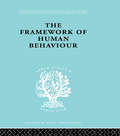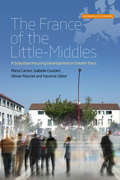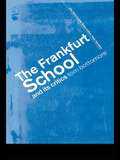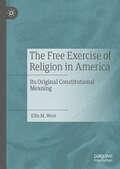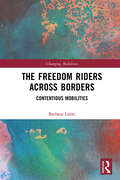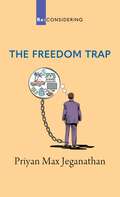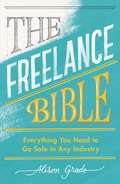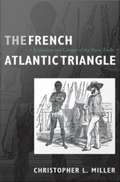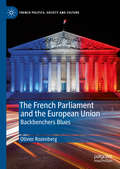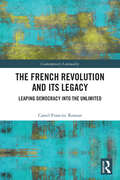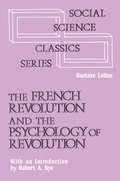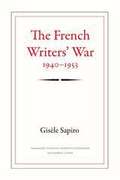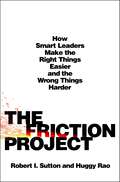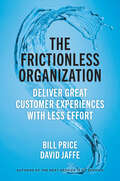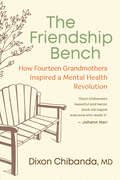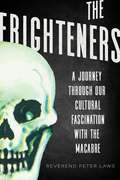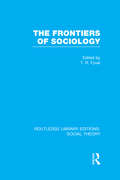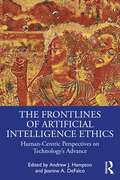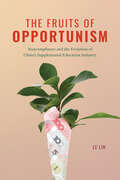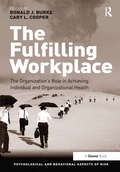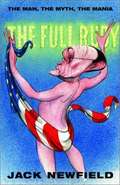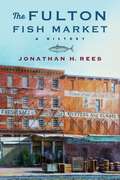- Table View
- List View
The Framework of Human Behaviour (International Library of Sociology #Vol. 244)
by Julian BlackburnFirst Published in 1998. Routledge is an imprint of Taylor & Francis, an informa company.
The France of the Little-Middles: A Suburban Housing Development in Greater Paris (Anthropology of Europe #1)
by Marie Cartier Isabelle Coutant Olivier Masclet Yasmine SiblotThe Poplars housing development in suburban Paris is home to what one resident called the “Little-Middles” – a social group on the tenuous border between the working- and middle- classes. In the 1960s The Poplars was a site of upward social mobility, which fostered an egalitarian sense of community among residents. This feeling of collective flourishing was challenged when some residents moved away, selling their homes to a new generation of upwardly mobile neighbors from predominantly immigrant backgrounds. This volume explores the strained reception of these migrants, arguing that this is less a product of racism and xenophobia than of anxiety about social class and the loss of a sense of community that reigned before.
The Frankfurt School and its Critics (Key Sociologists)
by The late BottomoreThe Institute of Social Research, from which the Frankfurt School developed, was founded in the early years of the Weimar Republic. It survived the Nazi era in exile, to become an important centre of social theory in the postwar era. Early members of the school, such as Adorno, Horkheimer and Marcuse, developed a form of Marxist theory known as Critical Theory, which became influential in the study of class, politics, culture and ideology. The work of more recent members, and in particular Habermas, has received wide attention throughout Europe and North America. Tom Bottomore's study takes a new and controversial look at the contributions of the Frankfurt School to modern sociology, examining several issues not previously discussed elsewhere. He discusses the neglect of history and political economy by the critical theorists, and considers the relationship of the later Frankfurt School to the radical movements of the 1960s and the present time. His critical analysis makes the school's writers accessible, through an assessment of their work and an exploration of the relationship of Critical Theory to other forms of sociological thought, especially positivism and structuralism.
The Frankfurt School, Jewish Lives, and Antisemitism
by Jack JacobsThe history of the Frankfurt School cannot be fully told without examining the relationships of Critical Theorists to their Jewish family backgrounds. Jewish matters had significant effects on key figures in the Frankfurt School, including Max Horkheimer, Theodor W. Adorno, Erich Fromm, Leo Lowenthal and Herbert Marcuse. At some points, their Jewish family backgrounds clarify their life paths; at others, these backgrounds help to explain why the leaders of the School stressed the significance of antisemitism. In the post-Second World War era, the differing relationships of Critical Theorists to their Jewish origins illuminate their distinctive stances toward Israel. This book investigates how the Jewish backgrounds of major Critical Theorists, and the ways in which they related to their origins, impacted upon their work, the history of the Frankfurt School, and differences that emerged among them over time.
The Free Exercise of Religion in America: Its Original Constitutional Meaning
by Ellis M. WestThis book explains the original meaning of the two religion clauses of the First Amendment: “Congress shall make no law [1] respecting an establishment of religion or [2] prohibiting the free exercise thereof.” As the book shows, both clauses were intended to protect the free exercise of religion or religious freedom. West shows the position taken by early Americans on four issues: (1) the general meaning of the “free exercise of religion,” including whether it is different from the meaning of “no establishment of religion”; (2) whether the free exercise of religion may be intentionally and directly limited, and if so, under what circumstances; (3) whether laws regulating temporal matters that also have a religious sanction violate the free exercise of religion; and (4) whether the free exercise of religion gives persons a right to be exempt from obeying valid civil laws that unintentionally and indirectly make it difficult or impossible to practice their religion in some way. A definitive work on the subject and a major contribution to the field of constitutional law and history, this volume is key to a better understanding of the ongoing constitutional adjudication based on the religion clauses of the First Amendment.
The Freedom Riders Across Borders: Contentious Mobilities (Changing Mobilities)
by Barbara LüthiThe Freedom Riders Across Borders: Contentious Mobilities provides the first comprehensive transnational historical analysis of the Freedom Rides. It explores the transnational history of these social movements and the struggles for the right to mobility and other civil rights in the United States of America, Australia, and Palestine between 1961 and 2011. This book makes a significant contribution to the transnational studies of social movements and the burgeoning field of mobility studies by investigating the specific constellations of mobility as historically and geographically specific formations of movement as well as investigating how the images, ideas and strategies of Freedom Riders were adapted, translated, and moved across time and space. Foremost, this book speaks to the pressing questions of the past and present concerning the politics and inequalities of mobilities impacting different social groups in different ways. From a historical perspective, it gives answers to the intensified interest and questions concerning the dynamics, techniques and "contentious politics" of social movements in a globalized environment. The book details how the question of mobility has come to constitute political conflict and protest over norms, restrictions, and representations. It shows not only that mobility is a differentially accessed resource which shapes and is shaped by political processes, but also that contestation is an equal part of forming mobility. The book identifies vehicles as a mobile site of contestation and, in the context of the Freedom Rides, as a site of strategic political action. In doing so, Lüthi makes a persuasive case for mobility to be given a central place in the study of progressive social movements. As such, this book will be of great interest to researchers in a number of disciplines, including history, geography and sociology.
The Freedom Trap (Re: CONSIDERING)
by Priyan Max JeganathanRe:CONSIDERING invites you to look at what’s familiar from an unfamiliar angle. To consider how we consider things – and how to do it better.Has our obsession with freedom distracted us from more important things?Freedom has crept out of our constitutions and legal systems and into our eating, shopping and live-streaming habits.There’s more and more to be free from: inconvenience, offence, limits – anything that stands in the way of what we want. And yet, we are – somehow – more anxious, grumpy and divided than ever.Can a society that’s drunk on freedom come back to its senses? What if freedom is a trap? And if it is, what can we do to free ourselves from it?
The Freelance Bible: Everything You Need to Go Solo in Any Industry
by Alison Grade'Finally! The book that millions of people have been crying out for. An empowering guide of how to use your work to achieve independence, inspiration and - crucially - balance' Bruce Daisley, author of The Joy of Work and VP,TwitterYou want to go freelance. You want to make your career work for you, on your terms and determined by your own definition of success. You want autonomy, flexibility and variety.But where do you start?In The Freelance Bible, award-winning entrepreneur and freelancer, Alison Grade, guides you through absolutely everything that you need to know to start your successful self-employed life.Starting from day one, she will help you develop your personal brand, pick up the financial essentials, grow your client base, manage your work-life balance, negotiate deals and value your time as you become more established. This is your complete guide to turning your talent into a fulfilling and sustainable career.'Alison strikes an excellent and inspirational balance; sharing tips and advice that help you work out how to be secure in insecurity and ace the journey to becoming a freelancer' Alex Mahon CEO, Channel 4
The French Atlantic Triangle: Literature and Culture of the Slave Trade
by Christopher L. MillerThe French slave trade forced more than one million Africans across the Atlantic to the islands of the Caribbean. It enabled France to establish Saint-Domingue, the single richest colony on earth, and it connected France, Africa, and the Caribbean permanently. Yet the impact of the slave trade on the cultures of France and its colonies has received surprisingly little attention. Until recently, France had not publicly acknowledged its history as a major slave-trading power. The distinguished scholar Christopher L. Miller proposes a thorough assessment of the French slave trade and its cultural ramifications, in a broad, circum-Atlantic inquiry. This magisterial work is the first comprehensive examination of the French Atlantic slave trade and its consequences as represented in the history, literature, and film of France and its former colonies in Africa and the Caribbean. Miller offers a historical introduction to the cultural and economic dynamics of the French slave trade, and he shows how Enlightenment thinkers such as Montesquieu and Voltaire mused about the enslavement of Africans, while Rousseau ignored it. He follows the twists and turns of attitude regarding the slave trade through the works of late-eighteenth- and early-nineteenth-century French writers, including Olympe de Gouges, Madame de Stal, Madame de Duras, Prosper Mrime, and Eugne Sue. For these authors, the slave trade was variously an object of sentiment, a moral conundrum, or an entertaining high-seas "adventure. " Turning to twentieth-century literature and film, Miller describes how artists from Africa and the Caribbean--including the writers Aim Csaire, Maryse Cond, and Edouard Glissant, and the filmmakers Ousmane Sembene, Guy Deslauriers, and Roger Gnoan M'Bala--have confronted the aftermath of France's slave trade, attempting to bridge the gaps between silence and disclosure, forgetfulness and memory.
The French Enlightenment and Its Others
by David Allen HarveyThis book explores the French Enlightenment's use of cross-cultural comparisons - particularly the figures of the Chinese mandarin and American and Polynesian savage - to praise of critique aspects of European society and to draw general conclusions regarding human nature, natural law, and the rise and decline of civilizations.
The French Parliament and the European Union: Backbenchers Blues (French Politics, Society and Culture)
by Olivier RozenbergThis book explores how the European Union has changed the French Parliament since 1992. It supports the view that the institutional adaptation of both assemblies to European affairs is largely superficial as it lacks a genuine involvement from members of parliament. Nevertheless, the role of backbenchers has changed in the context of European integration. New ways of behaving, thinking and representing have emerged. From specialized representatives to constituency members, from presidential aspirants to Eurosceptic sovereigntists, French national parliamentarians have adapted differently to the EU. Far beyond the sole scrutiny of European draft legislation, the book provides a comprehensive map of this changing environment. It supports the view that the process has been driven by the search for day-to-day emotional gratifications rather than utilitarian strategies.
The French Revolution and Its Legacy: Leaping Democracy into the Unlimited (Contemporary Liminality)
by Camil Francisc RomanThis book offers an interpretation of the French Revolution and modern democracy, arguing that the revolution gave rise to a democratic power that is liminal by nature, and therefore unlimited, unaccountable on principle, and the basis for a state religion of continuous transformation. It demonstrates these claims by focusing on the universally adulated but little understood sacred motto ‘liberté, egalité, fraternité’, and on the sacrifice and role of Louis XVI in the revolution. Analysing the revolutionary process by which representative democratic government took the shape of political metamorphosis, the book shows that modern democracy does not represent the people but refers to the representation of representation and the existential condition of permanent displacement. The present study will appeal to scholars from across the social, political and human sciences with an interest in the French Revolution, modern democracy, political modernity, contemporary politics and the history of art.
The French Revolution and the Psychology of Revolution
by Gustave Le BonIn his discussion of the general psychological causes of revolution, LeBon draws detailed illustrations of fundamental points from the French Revolution, especially the period from 1789 to 1800. LeBon's treatment of psychological causes is not confined to crowd actions or to the immediate descriptions of violent episodes in revolutions. He draws upon contemporary French clinical psychology to describe the pathological characteristics of the revolutionary leadership in France and explains many of the events of the period as a consequence of their influence.
The French Writers’ War, 1940–1953
by Vanessa Doriott Anderson Dorrit Cohn Gisèle SapiroThe French Writers' War, 1940-1953, is a remarkably thorough account of French writers and literary institutions from the beginning of the German Occupation through France's passage of amnesty laws in the early 1950s. To understand how the Occupation affected French literary production as a whole, Gisèle Sapiro uses Pierre Bourdieu's notion of the "literary field." Sapiro surveyed the career trajectories and literary and political positions of 185 writers. She found that writers' stances in relation to the Vichy regime are best explained in terms of institutional and structural factors, rather than ideology. Examining four major French literary institutions, from the conservative French Academy to the Comité national des écrivains, a group formed in 1941 to resist the Occupation, she chronicles the institutions' histories before turning to the ways that they influenced writers' political positions. Sapiro shows how significant institutions and individuals within France's literary field exacerbated their loss of independence or found ways of resisting during the war and Occupation, as well as how they were perceived after Liberation.
The Friction Project: How Smart Leaders Make the Right Things Easier and the Wrong Things Harder
by Robert I. Sutton Huggy RaoThe definitive guide to eliminating the forces that make it harder, more complicated, or downright impossible to get things done in organizations. Find out why Adam Grant says "If every leader took the ideas in this book seriously, the world would be a less miserable, more productive place."Every organization is plagued by destructive friction. Yet some forms of friction are incredibly useful, and leaders who attempt to improve workplace efficiency often make things even worse. Drawing from seven years of hands-on research, The Friction Project by bestselling authors Robert I. Sutton and Huggy Rao teaches readers how to become “friction fixers.”Sutton and Rao kick off the book by unpacking how skilled friction fixers think and act like trustees of others’ time. They provide friction forensics to help readers identify where to avert and repair bad organizational friction and where to maintain and inject good friction. Then their help pyramid shows how friction fixers do their work, from reframing friction troubles they can’t fix right now, so they feel less threatening, to designing and repairing organizations. The heart of the book digs into the causes and solutions for five of the most common and damaging friction troubles: oblivious leaders, addition sickness, broken connections, jargon monoxide, and fast and frenzied people and teams.Sound familiar? Sutton and Rao are here to help. They wrap things up with lessons for leading your own friction project, including linking little things to big things; the power of civility, caring, and love for propelling designs and repairs; and embracing the mess that is an inevitable part of the process (while still trying to clean it up).
The Frictionless Organization: Deliver Great Customer Experiences with Less Effort
by David Jaffe Bill PriceLearn how frictionless organizations cut costs, grow revenue, and create loyal fans by creating products and services that work so well, their customers never have to contact them for the wrong reasons.This book will help any customer-facing organization deliver better customer experiences, save money, and increase revenue. Veteran customer service experts Bill Price and David Jaffe, coauthors of the bestseller The Best Service Is No Service, explain how organizations can design products, sales, and support so that customer effort is reduced or, better still, removed. This simplicity for the customer is what Price and Jaffe call frictionless. The book defines a straightforward methodology, drawing on more than thirty practical examples from leading companies across four continents. The approach provides a radically different way for the whole business to focus on the customer experience. It explains how any organization can look at all customer interactions as potential opportunities for improvement and question whether they are helpful or represent symptoms of friction. Lower friction innovators are disrupting established businesses in every industry. This detailed guide shows how any business-from start-ups to major multinational corporations-can remove friction. Being frictionless has become a strategic necessity, and now this strategy is available to any organization.
The Friendship Bench: How Fourteen Grandmothers Inspired a Mental Health Revolution
by Dixon Chibanda“Dixon Chibanda’s beautiful and heroic book will inspire everyone who reads it.” — Johann Hari As featured on CBS Sunday Morning and NPR’s Here and Now A simple, human solution for loneliness and depression When Dr. Dixon Chibanda lost a patient to suicide, he began a soul-searching journey that eventually led to a mental healthcare revolution. As one of only six psychiatrists in all of Zimbabwe, a country traumatized by decades of conflict, Chibanda quickly realized that millions there were suffering from mental illness with no hope of receiving care. He saw that the only way to narrow this care gap was to leverage existing resources in the community, and one such resource was the compassion and understanding of grandmothers. With fourteen of these wise elders as partners, Chibanda pioneered the Friendship Bench program, a community-driven initiative addressing loneliness, depression, substance abuse, and suicide by fostering intergenerational connectedness. Since then, more than 500,000 people worldwide have sat on a park bench to share their personal stories with an empathetic grandmother. A primer on how human connection forms the bedrock of our resilience, The Friendship Bench gives readers the tools to facilitate transformative healing by reaching out to those who are struggling and isolated from the world around them. It’s a case study of how interventions supported by robust scientific evidence can be made accessible for all. Ultimately, it’s a celebration of the collective wisdom and knowledge of those rooted in their communities and their profound ability to foster belonging, purpose, and healing.
The Frighteners: A Celebration of our Fascination with the Macabre
by Peter LawsThe Frighteners is a bizarrely compelling, laugh-out-loud exploration of societies’ fascination with the dark, spooky, and downright terrifying side of life. The author--self proclaimed “sinister minister”--opens the book by reflecting on how he went from a horror-obsessed atheist to a God-fearing Christian and then reconciled his love of the macabre with his new faith. In the chapters that follow, Laws takes us on a worldwide romp to shine light on the dark corners of our own minds. An American hell house--controversial Christian “haunted houses” that act out the horrors of abortion, drug use, etc.—hosts his reflection on the use of horror in religion. A party in London with real life “vampires” exemplifies modern sexual fascination with the parasitic undead. He goes ghost hunting in an underground barbershop where a murderer used to cut hair. A professor in Denmark who is an expert on the recent Slenderman court case helps him explore the link between technology and the supernatural. In accessible and light-hearted prose, Peter Laws takes us from the dark corners of his mind to the underbelly of various macabre cultures to illuminate society’s preoccupation with death and horror. The Frighteners combines psychology, religious theory, and personal memoir to create a dynamic and fascinating read that is informative and entertaining.
The Frontiers of Sociology (RLE Social Theory)
by T. R. FyvelThe six essays in this volume are designed to introduce the general reader to some of the main issues in the fields of education, industry, politics, family changes and the like, which concern British sociologists. While each of the essays is independently conceived, their joint aim is to show how sociologists can use empirical methods to throw fresh light on current social problems and also to convey the distinctive approach, the distinctive view of the world towards which sociologists are striving.
The Frontlines of Artificial Intelligence Ethics: Human-Centric Perspectives on Technology's Advance
by Andrew J. HamptonThis foundational text examines the intersection of AI, psychology, and ethics, laying the groundwork for the importance of ethical considerations in the design and implementation of technologically supported education, decision support, and leadership training. AI already affects our lives profoundly, in ways both mundane and sensational, obvious and opaque. Much academic and industrial effort has considered the implications of this AI revolution from technical and economic perspectives, but the more personal, humanistic impact of these changes has often been relegated to anecdotal evidence in service to a broader frame of reference. Offering a unique perspective on the emerging social relationships between people and AI agents and systems, Hampton and DeFalco present cutting-edge research from leading academics, professionals, and policy standards advocates on the psychological impact of the AI revolution. Structured into three parts, the book explores the history of data science, technology in education, and combatting machine learning bias, as well as future directions for the emerging field, bringing the research into the active consideration of those in positions of authority. Exploring how AI can support expert, creative, and ethical decision making in both people and virtual human agents, this is essential reading for students, researchers, and professionals in AI, psychology, ethics, engineering education, and leadership, particularly military leadership.
The Fruits of Opportunism: Noncompliance and the Evolution of China's Supplemental Education Industry
by Le LinAn in-depth examination of the regulatory, entrepreneurial, and organizational factors contributing to the expansion and transformation of China’s supplemental education industry.Like many parents in the United States, parents in China, increasingly concerned with their children’s academic performance, are turning to for-profit tutoring businesses to help their children get ahead in school. China’s supplemental education industry is now the world’s largest and most vibrant for-profit education market, and we can see its influence on the US higher education system: more than 70% of Chinese students studying in American universities have taken test preparation classes for overseas standardized tests. The Fruits of Opportunism offers a much-needed thorough investigation into this industry. This book examines how opportunistic organizations thrived in an ambiguous policy environment and how they catalyzed organizational and institutional changes in this industry.A former insider in China’s Education Industry, sociologist Le Lin shows how and why this industry evolved to become a for-profit one dominated by private, formal, nationally operating, and globally financed corporations, despite restrictions the Chinese state placed on the industry. Looking closely at the opportunistic organizations that were founded by marginal entrepreneurs and quickly came to dominate the market, Lin finds that as their non-compliant practices spread across the industry, these opportunistic organizations pushed privatization and marketization from below. The case of China’s Education Industry laid out in The Fruits of Opportunism illustrates that while opportunism leaves destruction in its wake, it can also drive the formation and evolution of a market.
The Fulfilling Workplace: The Organization's Role in Achieving Individual and Organizational Health (Psychological and Behavioural Aspects of Risk)
by Ronald J. BurkeIt is very easy for organizations to ignore or overlook the impact of social and commercial change-of increased pressure to deliver profit (above all else) and of transformation in the ways in which we are now working-on the mental health and, consequently, the performance of their employees. And yet there is plenty of evidence that in many workplaces, performance is down, stress is up and professional employees are struggling to balance their home and work lives. This collection, while looking at individuals, places the spotlight on organizational initiatives to support the development of attitudes, values, character and behaviors in employees. The aim of these initiatives is to increase our resilience to those experiences and events which impact on performance. There is a particular focus on managerial and professional jobs where employee discretion and commitment are critical. The Fulfilling Workplace extends the themes developed in early titles in the Psychological and Behavioral Aspects of Risk Series deeper into organizations; to explore the organization's role in coming to grips both with human frailties and toxic workplaces-both destructive to individual and organizational health.
The Full Rudy: The Man, the Myth, the Mania
by Jack NewfieldIn this story the author gives the devil his due, conceding that New York City did become a better place to live during Giuliani's two terms. He was skilled at solving problems that lent themselves to the application of a military-style strategy.
The Fulton Fish Market: A History (Arts and Traditions of the Table: Perspectives on Culinary History)
by Jonathan H. ReesThe Fulton Fish Market stands out as an iconic New York institution. At first a neighborhood retail market for many different kinds of food, it became the nation’s largest fish and seafood wholesaling center by the late nineteenth century. Waves of immigrants worked at the Fulton Fish Market and then introduced the rest of the city to their seafood traditions. In popular culture, the market—celebrated by Joseph Mitchell in The New Yorker—conjures up images of the bustling East River waterfront, late-night fishmongering, organized crime, and a vanished working-class New York.This book is a lively and comprehensive history of the Fulton Fish Market, from its founding in 1822 through its move to the Bronx in 2005. Jonathan H. Rees explores the market’s workings and significance, tracing the transportation, retailing, and consumption of fish. He tells the stories of the people and institutions that depended on the Fulton Fish Market—including fishermen, retail stores, restaurants, and chefs—and shows how the market affected what customers in New York and around the country ate. Rees examines transformations in food provisioning systems through the lens of a vital distribution point, arguing that the market’s wholesale dealers were innovative businessmen who adapted to technological change in a dynamic industry. He also explains how changes in the urban landscape and economy affected the history of the market and the surrounding neighborhood.Bringing together economic, technological, urban, culinary, and environmental history, this book demonstrates how the Fulton Fish Market shaped American cuisine, commerce, and culture.
